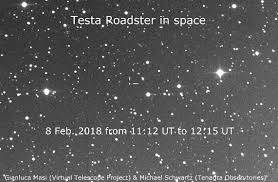Fly, Starman, fly! The Tesla Roadster and its mannequin driver, that launched into spaceaboard SpaceX‘s first Falcon Heavy rocket on Tuesday (Feb. 6), has been spotted zipping through space by a telescope on the ground. And we can’t stop watching it!
Yesterday (Feb. 8), Gianluca Masi of the Virtual Telescope Project and Michael Schwartz of the Tenagra Observatory joined forces to make a direct observation of the rocket payload. The car and its spacesuit-wearing driver named “Starman” were launched from the Kennedy Space Center in Cape Canaveral, Florida, and have captured the attention of people all over the world.
The new observation of the Roadster, obtained by a robotically controlled telescope at the Tenagra Observatory in Arizona (a participating observatory in the Virtual Telescope Porject), shows the car moving across the night sky. In its current orbit around the sun, the car will travel between 91.3 million and 161.5 million miles (147 million and 260 million kilometers) from the star, according to a statement from the Virtual Telescope Project. (We set the zoomed-in views to the rockin’ song “Here to Mars” by the band Coheed and Cambria) [In Photos: SpaceX’s 1st Falcon Heavy Rocket Test Launch Success!]
 The statement goes on to say that Masi and Schwartz were able to pinpoint the the car’s location by using data generated by the Solar Systems Dynamics Laboratory at NASA’s Jet Propulsion Laboratory (JPL).
The statement goes on to say that Masi and Schwartz were able to pinpoint the the car’s location by using data generated by the Solar Systems Dynamics Laboratory at NASA’s Jet Propulsion Laboratory (JPL).
NASA designated the car “Tesla Roadster (Starman, 2018-017A),” and said that it is on a heliocentric orbit with a perihelion (minimum distance from the sun) of 0.99 astronomical units (AU), or about 92 million miles (148 million km). The car’s aphelion (farthest distance from the sun) is about 1.7 AU, or about 158 million miles (254 million km). However, the car’s course will be hard to predict in the future due to “unmodelled solar pressure, thermal radiation, or outgassing acceleration that are not yet characterized,” according to JPL.
It was the first demonstration flight for the SpaceX megarocket. SpaceX CEO Elon Musk, who owned the car, had said previously that he felt there was a high likelihood of the rocket malfunctioning or exploding. In a tweet, former NASA deputy administrator Lori Garver said she was told by a SpaceX vice president that the Tesla Roadster payload was the backup after NASA, the U.S. Air Force and others declined to fly a satellite for free atop the untested rocket.
The car was originally intended to be inserted into an orbit that would fly closer to Mars, but the third engine burn of the Falcon Heavy upper stage “exceeded” that orbit, according to Musk.
Regardless of intention, the Roadster has inspired millions of people to look up.
Also read: SpaceX Is Launching Its First Internet Satellites This Week



